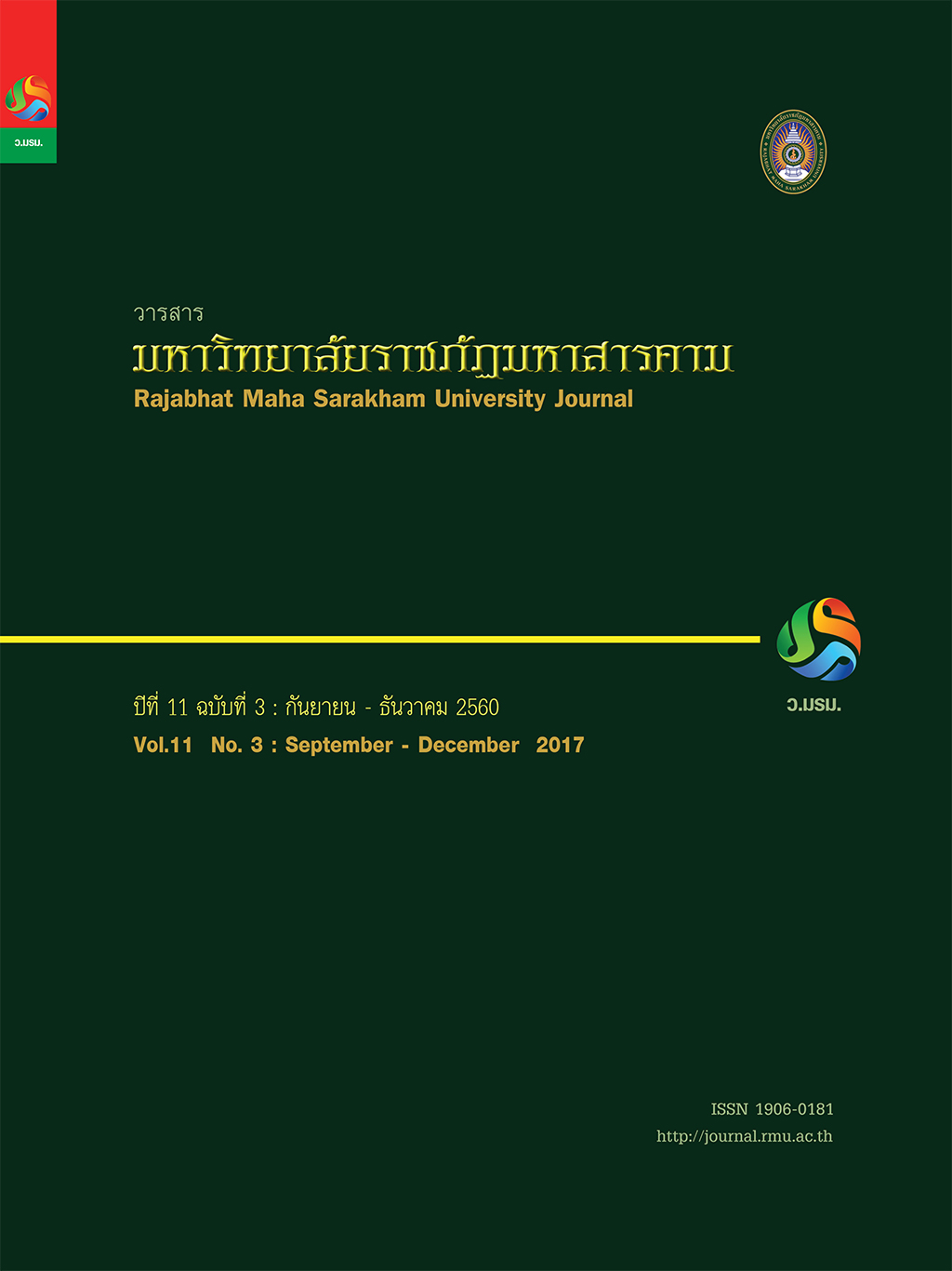การสำรวจมุมมองการสอนสะเต็มศึกษาของนิสิตครูวิทยาศาสตร์
Main Article Content
บทคัดย่อ
มุมมองของครูเกี่ยวกับการสอนสะเต็มศึกษา เป็นส่วนประกอบสำคัญที่สามารถแสดงและทำนายการปฏิบัติการสอนของครูใน
ห้องเรียนได้ งานวิจัยนี้จึงมีวัตถุประสงค์เพื่อสำรวจมุมมองเกี่ยวกับการสอนสะเต็มศึกษาของนิสิตครูวิทยาศาสตร์ จำนวน 24 คน ซึ่ง
กำลังศึกษาในหลักสูตรครุศาสตรบัณฑิต ชั้นปีที่ 4 สาขาวิทยาศาสตร์ งานวิจัยนี้จึงใช้แบบสอบถามแบบปลายเปิด ครอบคลุมประเด็น
เกี่ยวกับ ความรู้ความเข้าใจเกี่ยวกับสะเต็มศึกษา ความสำคัญในการสอนสะเต็มศึกษา การออกแบบกิจกรรมสะเต็มศึกษา บทบาทของ
ครูและบทบาทของผู้เรียน หลักการวิธีสอน สื่อ วัสดุและแหล่งการเรียนรู้ ตลอดจนการวัดและประเมินผล วิเคราะห์ข้อมูลโดยใช้กระบวน
ทัศน์การตีความ ผลการวิจัยพบว่านิสิตครูวิทยาศาสตร์เข้าใจเกี่ยวกับสะเต็มศึกษาบางส่วนเกือบทุกประเด็น อีกทั้งมีความเข้าใจศาสตร์
ทั้ง 4 ของสะเต็มศึกษา (วิทยาศาสตร์, เทคโนโลยี, คณิตศาสตร์ และวิศวกรรมศาสตร์) ยังไม่ชัดเจน นิสิตครูวิทยาศาสตร์ส่วนใหญ่มี
มุมมองในการจัดการเรียนรู้ สะเต็มศึกษาโดยการใช้กิจกรรมการใช้โครงงานเป็นฐาน
Article Details
1. บทความที่ลงตีพิมพ์ทุกเรื่องได้รับการตรวจทางวิชาการโดยผู้ประเมินอิสระ ผู้ทรงคุณวุฒิ (Peer Review) สาขาที่เกี่ยวข้อง อย่างน้อย 3 ท่าน ในรูปแบบ Double blind review
2. ข้อคิดเห็นใด ๆ ของบทความที่ลงตีพิมพ์ในวารสารมหาวิทยาลัยราชภัฏมหาสารคาม นี้เป็นของผู้เขียน คณะผู้จัดทำวารสารไม่จำเป็นต้องเห็นด้วย
3. กองบรรณาธิการวารสารมหาวิทยาลัยราชภัฏมหาสารคาม ไม่สงวนสิทธิ์การคัดลอกแต่ให้อ้างอิงแสดงที่มา
เอกสารอ้างอิง
A 2020 Vision. Technology and Engineering
Teacher, PP. 30-35.
[2] O’Neill,T., L.Yamagata, J. Yamakata and S. Togioka.
(2012). Teaching STEM Means Teacher Learning.
Phi Delta Kappan. 94(1) : 36-40.
[3] Magnusson, S., J. Krajcik and H. Borko. (1999).
Nature, Sources, and Development of Pedagogical
Content Knowledge for Science Teaching. In J.
Gess-Newsome and N.G. Lederman (Eds.),
Examining Pedagogical Content Knowledge : the
Construct and its Implications for Science
Education (pp. 95-132). Dordrecht : Kluwer.
[4] Friedrichsen, P., D. Lankford, P. Brown, E. Pareja,
M. Volkmann, and S. Abell. (2007). The PCK of
Future Science Teachers in an Alternative
Certification Program. Paper presented at the
National Association for Research in Science
Teaching Annual Conference. New Orleans, LA.
[5] Park and J. S. Oliver. (2008). “Revisiting the
Conceptualization of Pedagogical Content
Knowledge (PCK) : PCK as a Conceptual Tool to
Understand Teachers as Professionals,” Research
in Science Education. 38 : 261-284.
[6] Buaraphan, Khajonsak; Rodraengkla, Wanthipha;
Srisukwattananan, Phawinee; Sing, Phenjan.
(2007). Development and Survey of Knowledge
in Content and Teaching Method of Physics
Student and Teacher from the Teaching Method
Subject to Experience Teacher Training. The 45th
National Academic Conference of Kasetsart
University : Education, Economics and Business
Administration and Humanities and Social
Sciences Program, Kasetsart University.
[7] Friedrichsen P. M., H. Jan and D. Van. (2011).
Taking a Closer Look at Science Teaching
Orientations. Science Education. 95 : 358 - 376.
[8] Kadriye B., Y. Hülya, S. Ahmet. (2016). Determining
pre-service teachers’ Goalorientations for learning
through a card-sortingactivity. International
Journal of Learning and Teaching. Volume 8 (1)
: 40-52.
[9] Segall, A. (2004). Revisiting pedagogy. Teaching
and Teacher Education. 20 : 489-504.
[10] Kaya, O.N. (2009). “The Nature of Relationships
among the Components of Pedagogical Content
Knowledge of Preservice Science Teacher : Ozone
layer Depletion’as an example”, International
Journal of Science Education. 7(1) : 961-988.
[11] Brown, P., P. Friedrichsen and S. Abell, (2013). The
Development of Prospective Secondary Biology
Teachers PCK. Journal of Science Teacher
Education. 24(1) : 133-155.
[12] Promkhadkeaw, Thepkatya; Sung-orng, Sunan and
Keawwaiyuth, Smarn. (2007). “Semi-structured
Interview Development for Studying the Concept
and Teaching Method of Science Nature”, Song
klanakarin Journal of Social Sciences and
Humanities. 13(4) : 513-523.


